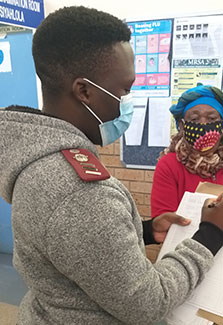Fogarty fellow captures 'lived experiences' of frontline health care workers, COVID-19 patients in South Africa
July / August 2020 | Volume 19, Number 4
By January W. Payne
Health care workers are the heroes of COVID-19, but little attention has been paid to their perceptions of serving on the frontlines in Africa. A Fogarty fellow is launching a study to capture their ‘lived experiences’ - and those of their patients - to better understand their observations of the outbreak, innovative approaches taken to address it, gaps observed in the health system, and the mental and psychological effects they are feeling.

Photo courtesy of Themba Nxumalo
MEPI junior faculty fellow Themba
Nxumalo is studying the ‘lived experiences’
of frontline health care workers, COVID-19
patients and their families in South Africa.
Gathering this evidence quickly is important, according to Themba Nxumalo, a nurse at a rural community health center in South Africa who is conducting the research. “How health care workers are responding right now is shaped by how the virus is spreading at the moment,” he said. “My findings could have public health implications for the quality of patient care provided, as well as for training, preparation and care of health care workers during this outbreak and as those that may occur in the future.”
A Ph.D. candidate in nursing at the University of KwaZulu-Natal (UKZN), Nxumalo is a fellow in the
Medical Education Partnership Initiative (MEPI) junior faculty research training program. The UKZN
grant to strengthen the research culture in South Africa is funded by the NIH Office of the Director and the NIH’s National Institute of Mental Health (NIMH).
Nxumalo is interviewing about 20 primary care health workers - including nurses, doctors, facility managers, and allied health professionals such as pharmacists and physiotherapists - working in one rural and one urban community health clinic. His exploratory, descriptive study is designed to capture their first impression of the pandemic’s arrival in their country, as well as their fears, stigma witnessed and achievements made while diagnosing and treating COVID-19 patients. “I'm working in a low-income, rural setting. When the pandemic first started, basic things like personal protective equipment were not available,” said Nxumalo. Some PPE arrived as the pandemic progressed, which has been reassuring for workers at his clinic, he said. Another local issue was difficulty complying with the South African government’s policy that those testing positive had to be isolated - difficult in his community.
Previously published research has shown that health care workers endure physical and mental health repercussions when dealing with disease outbreaks. Concerns for personal safety are to be expected. Additionally, hearing reports of fellow health care workers getting infected and/or dying from COVID-19 can lead to fear and distress, Nxumalo said. His research aims to document these experiences in real time while his colleagues are still in the midst of the pandemic.
He also plans to conduct interviews with people who contracted COVID-19, as well as their families, to study the impact on them. “Something that affects one member will affect the entire family,” he noted. The outbreak caused suffering due to separation during patient quarantine, financial difficulties and psychological problems, all of which could be better understood through anecdotal evidence, he said. Nxumalo suggested his Fogarty fellowship helped position him to make these kinds of observations and connections in the midst of a global pandemic that could help guide future public health response.
Prior to participation in the MEPI program, he was not exposed to scientific and academic writing - something he craved. “The fellowship gave me the skills to write effective articles, publish and network,” he explained. His training opened his eyes to the issues he and his colleagues face providing primary care and gave him the research skills necessary to uncover the root causes of these problems, Nxumalo said. “The first step is collecting evidence, then looking at it from a scientific research perspective and finally marrying the two to find a solution.” He said he views research as a craft - one that he’s become very comfortable practicing. “I know what I’m doing but there’s still a lot to learn because learning never stops.”
More Information
To view Adobe PDF files,
download current, free accessible plug-ins from Adobe's website.
Related Fogarty Programs
Related World Regions / Countries